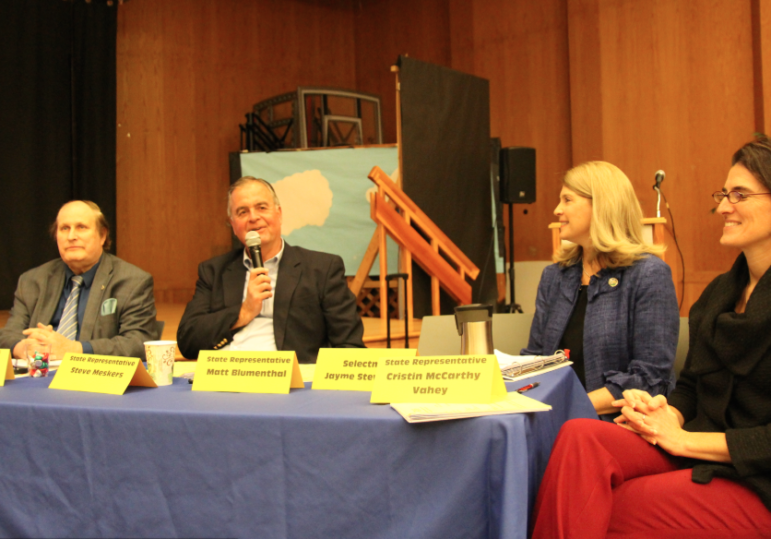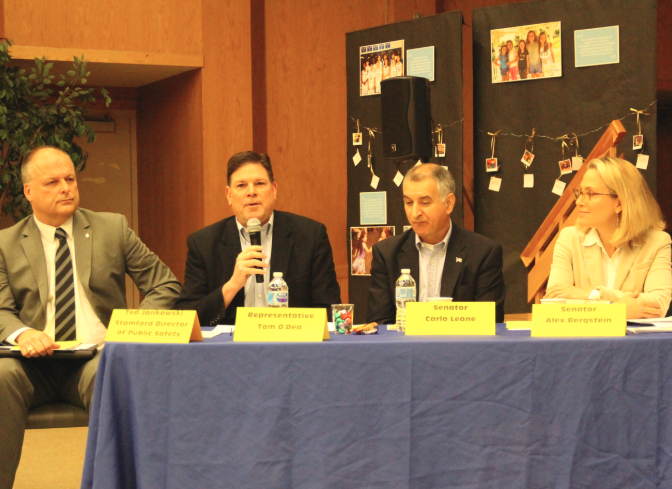What the state Legislature and government in general can do to reduce vaping among teenagers was one of the main topics of a meeting Monday, where area legislators met with people on the frontlines of the effort in local communities: school officials, police
Although legislators sat at a table facing the audience, more than one participant in the crowd and at the table said that keeping teens away from vaping is primarily a local battle, and a lot of the discussion was about local efforts.
— This article was published Monday by Greenwich Free Press.
About 100 people were at the event, organized by Communities 4 Action, which also included area health officials, social workers, psychologists and local government leaders, including Darien First Selectman Jayme Stevenson.

Photo by Leslie Yager for Greenwich Free Press
First Selectman Jayme Stevenson was one of the participants discussing state policies on reducing vaping. That is not Matt Blumenthal speaking.
The meeting, a “legislative breakfast” at the Jewish Community Center in Stamford, was organized b y Communities 4 Action, a group that seeks to reduce substance misuse among youths and adults.
Vaping is the act of inhaling and exhaling vapors and electronic (e-cigarettes) are the most widely used tobacco product among teens. The rate of use doubled between 2015-2017. Vaping can be done with marijuana, tobacco products or without either. Connecticut does not tax any e-cigarettes or vaping products.
Vaping Every Hour
State Sen.-elect Alex Bergstein said she had recently spoken to a 17-year-old about that teen’s addiction to vaping. “She started it because her friends were all doing it and never, never thought she’d become addicted.” Bergstein said the teen told her all her friends from school were vaping every hour.

A photo from a poster promoting a Darien Depot presentation on vaping and e-cigarettes for parents last month.
“And she said parents are actually supplying them these products because they think they manage stress and perform better in school — or so they thought” Bergstein said. “I think there should be an added responsibility for parents.”
At the Federal Level
The topic of vaping and e-cigarettes is one that the federal government has had difficulty keeping up with. The industry and technology has changed rapidly.
This year the FDA released some new rules to bring e-cigarettes and roll-your-own cigarettes under the same regulations for traditional cigarettes.
A participant at the meeting said warnings on e-cigarette packaging are not helpful because nine out of 10 times they don’t indicate the product contains nicotine. The FDA isn’t regulating these products, which is why the warnings are often inaccurate.
State-level Policies to Reduce Vaping
Communities 4 Action shared a slide that said a 10 percent tax increase on cigarette prices correlates to a reduction in smoking of 3.5 percent and among kids by 6 to 7 percent, but that Connecticut does not tax e-cigarettes or any vaping product.
A representative from Communities 4 Action said licensing is a long accepted regulatory tool used by government to control tobacco retailer locations to reduce youth initiation rates.
Legislators on Monday’s panel were asked whether they would favor levying a tax on e-cigarettes and vaping products, whether they supported increasing the license fees for retailers, and whether they supported increased penalties for selling vaping products to children.
Currently the fine for selling, giving or delivering an e-cigarette to a minor under 18 is $200 for the first offense, $350 for the second offense within 24 months, and $500 for each subsequent offense within 24 months.
Bergstein, the state senator-elect, suggested raising the age of sale from 18 to 21, which was applauded by the audience.
Steve Meskers said fines on retailers and licensing fees fall into the “sin tax” category and that he was concerned the taxes and fees might go into the general fund rather than toward remediation.
Darien First Selectman Jayme Stevenson said the idea of levying higher licensing fees and fines on local retailers is good but requires enforcement.

Photo by Leslie Yager for Greenwich Free Press
Panelists included (from left) Ted Jankowski, the director of public safety in Stamford; State Rep. Tom O’Dea; state Sen. Carlo Leone (who represents parts of Darien and Stamford) and state Sen.-elect Alex Bergstein of Greenwich.
“It’s particularly burdensome on local government,” she said. “Some cities and towns don’t have the resources to enforce the ordinances towns are putting on their books these days. I’m interested in the idea of a higher license fee for retailers, but I’m supportive of raising the age to 21.”
During the discussion, it was pointed out that especially in wealthy towns, fines don’t provide much of a disincentive for retailers selling to minors.
“Retailers need to lose their license,” one Communities 4 Action member said.
“I’d like to outlaw vaping, quite frankly,” said State Sen. Carlo Leone, a Democrat who represents parts of Stamford and Darien.
“We’ve done so much on cigarette reduction, but this new technology came up and was targeted to adults as an alternative to cigarettes,” he said. “But it’s been marketed as cool. A lot of education needs to come into play. The industry will want to make sure they have the ability to sell the product, but we need to protect our children. There is going to be a lot of public hearings and public debate.”
State Rep Tom O’Dea said he supports the increase in penalties for sales of vaping products to minors.
“The maximum fine for selling/giving/delivering an e-cigarette to a minor currently is $200,” O’Dea said. “I support taxing e-cigarettes same as cigarettes.”
At the Local Level
Dennis Budnicki from Liberation Programs, who frequently spends time at Greenwich High School, said there is such a thing as a vaping detector and that they can be installed in school bathrooms.
“But they’re very expensive — like $3,000 each,” he said. “To put them in student bathrooms, they can detect the vape and disturbance of kid horsing around in a bathroom. That would signal the telephones to security,” Budnicki said.
Michael Pollard, chief of staff for Stamford Mayor David Martin, said legislation is one thing, but there needs to be early education about vaping.
“We can regulate to death, but until people understand the impact, behavior won’t change,” he said. “It’s not just a one time hit. We have to do it over and over again until users fully understand its implications.”
Bergstein said adults sharing data with young people is fine, but ultimately, she said, “It’s seen as adults preaching to kids. It’s kids talking to one another about the dangers and impacts in their lives that will really change the dynamic,” Bergstein said. “We can penalize and penalize, but that doesn’t change behavior as much as education and positive peer pressure.”
A social worker from Westhill High School said when she was a teen there was the DARE program. DARE stands for Drug Abuse Resistance Education. “We don’t have anything like that,” she said. “We need something like DARE and to work with kids starting when they’re young. Right now we’re now just doing triage.”

